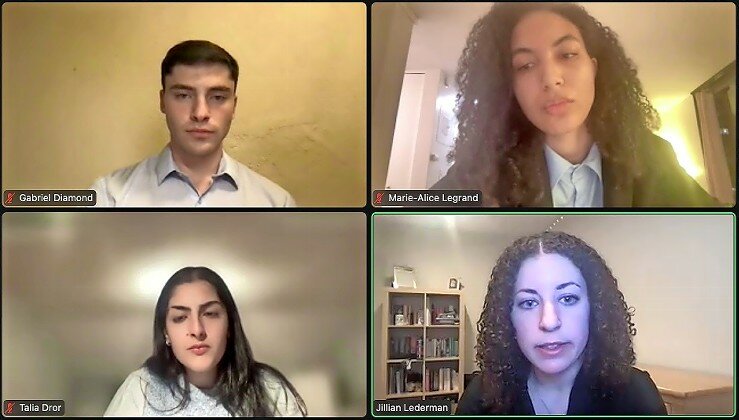Ivy students tell Touro forum: It’s really bad
For Jews on American campuses, things may actually be worse than they appear.
That’s a conclusion that might be drawn from a discussion Monday night among four Ivy League students on Touro Talks, an online lecture series hosted by Touro Law’s Jewish Law Institute.
Reflecting on the explosion of antisemitic rage on campuses following Oct. 7, Brown University student Jillian Lederman said that is not how it should be.
“When things of this scale happen in the world, college campuses really should be the best possible places to be,” Lederman said. “We should have been so lucky to be on college campuses when this happened because of exposure to experts in the field” and the opportunity to have debates and conversations about the issues at hand.
“We haven’t seen that because when people define Zionists as being to their core evil or to their core racist, there isn’t a lot of opportunity for dialogue,” she continued.
“My visibly Jewish friends have been deliberately targeted at Columbia,” recounted Marie-Alice Legrand, who is German and not Jewish. “They have been spat on. They have been subjected to antisemitic rants where people have directly said to them, ‘F’ the Jews, and I hope you suffer.”
The Columbia Law School student said that “there was a massive rally on campus which celebrated Oct. 7 as a great success, as a ‘resistance.’ They were calling for the globalization of intifada. Professors have come to the support of student organizations which issued statements that put the blame exclusively on Israel for Oct. 7, statements which have not offered any compassion or any empathy to the Jewish and Israeli students.”
“Education is important,” she said. “I was fortunate to have received a really good public education on the Holocaust in Germany, which has greatly informed my understanding of antisemitism today. It’s important that professors and the administration combat the ongoing intentional misinformation campaign against Israel, which is a blood libel. It’s outrageous that these falsehood stand uncorrected.”
“We are providing platforms for the endorsement of terrorism on our campuses,” said Long Islander Talia Dror, a junior at Cornell University. “In the immediate aftermath of the Oct. 7 attacks, the Student Assembly introduced a resolution essentially glorifying Hamas’ actions as ‘resistance’.”
At a rally that week, a professor said he was both exhilarated and energized by the Hamas attacks, she recalled. “Jewish students had to unenroll from his class because they didn’t feel comfortable being taught by a professor that is exhilarated by the murderous barbaric killing of 1,500 innocent civilians.”
In the days that followed at Cornell, there were threats to bomb the Center for Jewish Living and shoot up the kosher dining hall; there were Students for Justice in Palestine protests, and “professors indoctrinating students in their classes, singling out Jewish students and making them explain their views on the Israeli-Palestinian conflict or the genocide in Gaza to their entire class. And then, most recently, SJP with other student groups occupied buildings on campus until the university conceded to their demands.”
“Students genuinely felt unsafe walking into the building that day because it was decorated with signs that said ‘Intifada from Gaza to Ithaca,’ which is a deliberate call for the killing of Jewish students on our campus,” Dror continued. “And upon raising that to the administration, the administration emphasized that some people view the word intifada differently — and so due to the different definitions of the word intifada, it’s within their freedom of speech abilities to say that they would like to cause an intifada in Ithaca.”
Yale student Gabriel Diamond said that while “Israel was always a bit of an issue” before Oct. 7, it “didn’t really inspire big things.”
But “right from the get-go” after the Hamas terror, even before there was any Israeli response, “students decided to rally to celebrate their so-called ‘resistance’.” Someone hoisted a Palestinian flag on top of a large menorah.
“What a menorah has to do with Palestinian resistance, I’m not exactly sure,” Diamond said.
Several times, the students touched on the notion that, in Diamond’s words, “a lot of Jewish students on campus feel isolated.”
“There’s the sense that instead of actually dealing with the problem [created by] this climate of intimidation or hostility, the universities are essentially telling us how you have your Jewish spaces, your Hillels, your Chabads — go there, go retreat into your safe spaces. Instead of dealing with the problem, it just forces Jews into a corner.”
“It all feels like an attempt to shove Jews out of the broader community into their secluded areas,” said Cornell’s Dror. “Basically saying like, ‘Oh, you can go to the kosher dining hall — but main campus, that’s not safe for you’.”
“You’ve painted a pretty frightening picture of what’s going on some college campuses,” concluded Touro University President Alan Kadish, who moderated the discussion.
While many of Touro’s numerous campuses have substantial Jewish populations, its graduate programs especially attract a diverse enrollment and some are not entirely isolated from difficulties.
At one such program a few years ago, “students’ attitude was, we stick to Hillel, we stick to our own and we don’t let the outside environment bother us,” he said.
The Touro Talks series is organized by Samuel J. Levine, professor of law and director of the Jewish Law Institute at the Touro Law Center in Central Islip, and introduced by Nahum Twersky, director of Touro Talks at Touro University.






